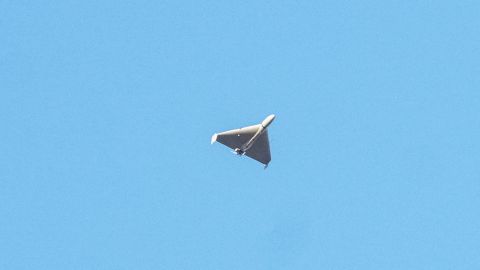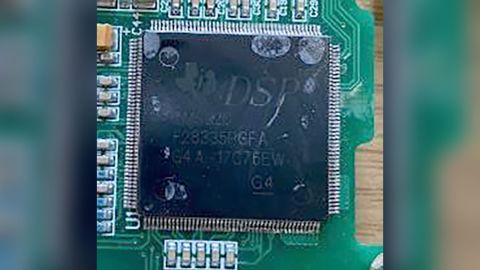Washington
CNN
—
Parts made by more than a dozen US and Western companies were found in a single Iranian drone that was shot down in Ukraine last fall, according to an assessment by Ukraine’s intelligence agency obtained exclusively by CNN.
The assessment, released to US government officials late last year, underscores the magnitude of the problem facing the Biden administration, which has vowed to halt Iranian production of drones that Russia is sending to Ukraine by the hundreds.
CNN reported last month that the White House has set up an administration-wide task force to study how U.S. and Western-made technology — from smaller devices like semiconductors and GPS modules to larger parts like motors — is being incorporated into Iranian drones reached.
The options for combating the problem are limited. For years, the US has imposed strict export control restrictions and sanctions to prevent Iran from receiving high-quality materials. Now US officials are looking at increased enforcement of these sanctions, encouraging companies to better monitor their own supply chains and, perhaps most importantly, trying to identify the third-party vendors who are taking these products and reselling them to bad actors.
There is no evidence that any of these companies are violating US sanctions laws and knowingly exporting their technology for use in the drones. Even as many companies promise increased surveillance, it’s often very difficult for manufacturers to control where these ubiquitous parts end up in the global marketplace, experts told CNN. Businesses may also not know what they are looking for if the US government has not caught up and sanctioned the actors who buy and sell the products for illegal purposes.
And the Ukrainian intelligence assessment is further evidence that despite sanctions, Iran is still finding a wealth of commercially available technology.

Of the 52 components Ukrainians removed from Iran’s Shahed-136 drone, 40 are estimated to have been made by 13 different American companies.
The remaining 12 components are said to have been manufactured by companies in Canada, Switzerland, Japan, Taiwan and China.
Sanctioned Iranian companies appear to be successfully evading efforts to cut off their supplies of critical components and electronics. For example, the company that built the downed drone, Iran Aircraft Manufacturing Industries Corporation (HESA), has been under US sanctions since 2008.
A big problem is that it’s much easier for Russian and Iranian officials to set up shell companies to buy the equipment and evade sanctions than it is for Western governments to uncover these shell companies, which can sometimes take years, experts said.
“This is a whack-a-mole game. And the United States government needs to get incredibly good at Whack-a-Mole, period,” said former Pentagon official Gregory Allen, who now serves as director of the Artificial Intelligence Governance Project at the Center for Strategic and International Studies. “It’s a core competency of the US national security apparatus – or better it should be.”
Finally, Allen, who recently co-authored a study on the effectiveness of US export controls, said: “There is no substitute for robust, internal capabilities in the US government.”
He warned that this would not be an easy task. The microelectronics industry relies heavily on third-party vendors and resellers who are difficult to trace, and the microchips and other small devices that end up in so many Iranian and Russian drones are not only inexpensive and widely available, they’re also easy to hide.
“Why do smugglers like diamonds?” Allen said. “Because they are small, light and worth a lot of money. And unfortunately, computer chips have similar properties.” Success isn’t necessarily measured by stopping 100% of transactions, he added, but by making it harder and more expensive for bad actors to get what they need.
The rush to stop Iran from manufacturing the drones is becoming increasingly urgent as Russia continues to deploy them with relentless ferocity across Ukraine, targeting both civilian areas and vital infrastructure. According to US officials, Russia is also preparing to set up its own factory to manufacture them with Iranian help. On Monday, Ukrainian President Volodymyr Zelenskyy said that Ukrainian forces shot down more than 80 Iranian drones in just two days.

Zelenskyi also said that Ukraine has information that Russia is “planning a prolonged attack with shaheds” and bet that it will lead to the “exhaustion of our people, our air defenses, our energy sector”.
A separate investigation into Iranian drones shot down in Ukraine, conducted by British investigative firm Conflict Armament Research, found that 82% of the components were made by US-based companies.
Damien Spleeters, deputy operations manager at Conflict Armament Research, told CNN sanctions will only be effective if governments continue to monitor what parts are being used and how they got there.
“Iran and Russia will try to circumvent these sanctions and will try to change their sourcing channels,” Spleeters said. “And that’s what we want to focus on: being on site and opening up those systems, tracking the components and monitoring for changes.”
Experts also told CNN that if the US government wants to step up enforcement of the sanctions, it needs to devote more resources and hire more staff who can be on the ground to prosecute the suppliers and resellers of these products.
“No one really thought of investing more in agencies like the Bureau of Industry Security, which were really sleepy parts of DC’s national security institute for a couple of decades,” CSIS’s Allen said, referring to a division of the Department of Commerce that deals primarily with the enforcement of export controls. “And now they’re suddenly at the forefront of the national security technology competition and not remotely resourced in that way.”
According to Ukrainian estimates, among the US-made components found in the drone were nearly two dozen parts built by Texas Instruments, including microcontrollers, voltage regulators, and digital signal controllers; a GPS module from Hemisphere GNSS; a microprocessor from NXP USA Inc.; and circuit board components from Analog Devices and Onsemi. Components built by International Rectifier – now owned by German company Infineon – and Swiss company U-Blox were also discovered.

CNN last month sent email requests for comment to all the companies identified by the Ukrainians. The six who responded emphasized that they condemn any unauthorized use of their products, while noting that combating the diversion and misuse of their semiconductors and other microelectronics is an industry-wide challenge that they are working to address.
“TI does not sell products to Russia, Belarus or Iran,” Texas Instruments said in a statement. ” TI will comply with applicable laws and regulations in the countries in which we operate and will cooperate with law enforcement authorities as necessary and appropriate. Additionally, we do not endorse or condone the use of our products in applications for which they were not designed.”
Gregor Rodehuser, a spokesman for German semiconductor manufacturer Infineon, told CNN: “Our position is very clear: Infineon condemns the Russian aggression against Ukraine. It is a blatant violation of international law and an attack on human values.” He added: “Except for direct sales, it proves difficult to control subsequent sales throughout a product’s lifetime. Nonetheless, we instruct our customers, including dealers, to only conduct subsequent sales in accordance with applicable regulations.”
Analog Devices, a semiconductor company headquartered in Massachusetts, said in a statement that it is increasing its efforts “to identify and address these activities, including implementing enhanced monitoring and auditing processes and taking enforcement action as appropriate…to help reduce unauthorized resale, diversion and unintentional misuse of our products.”
Jacey Zuniga, director of corporate communications for Austin, Texas-based semiconductor company NXP USA, said the company “complies with all applicable export control restrictions and sanctions imposed by the countries in which we operate. Military applications are not a focus area for NXP. As a company, we vehemently oppose the use of our products for human rights abuses.”
Phoenix, Arizona-based semiconductor manufacturing company Onsemi also said it “complies with applicable export control and economic sanctions laws and regulations and does not sell, directly or indirectly, to Russia, Belarus, or Iran, or to foreign military organizations.” We work with law enforcement and government agencies as necessary and appropriate to demonstrate how Onsemi conducts its business in compliance with all legal requirements and that we adhere to the highest standards of ethical conduct.”
Swiss semiconductor maker U-Blox also said in a statement that its products are for commercial use only, and that using its products on Russian military equipment “is a clear violation of u-blox’s Terms of Sale, which apply to customers and distributors alike.” are valid. ”

